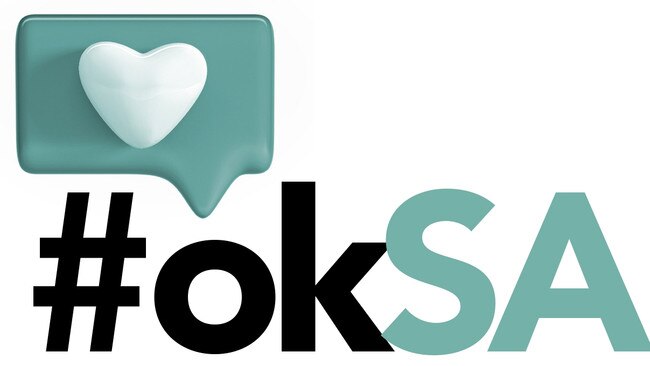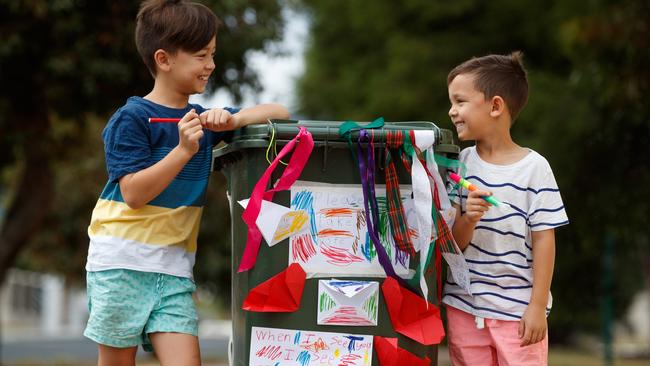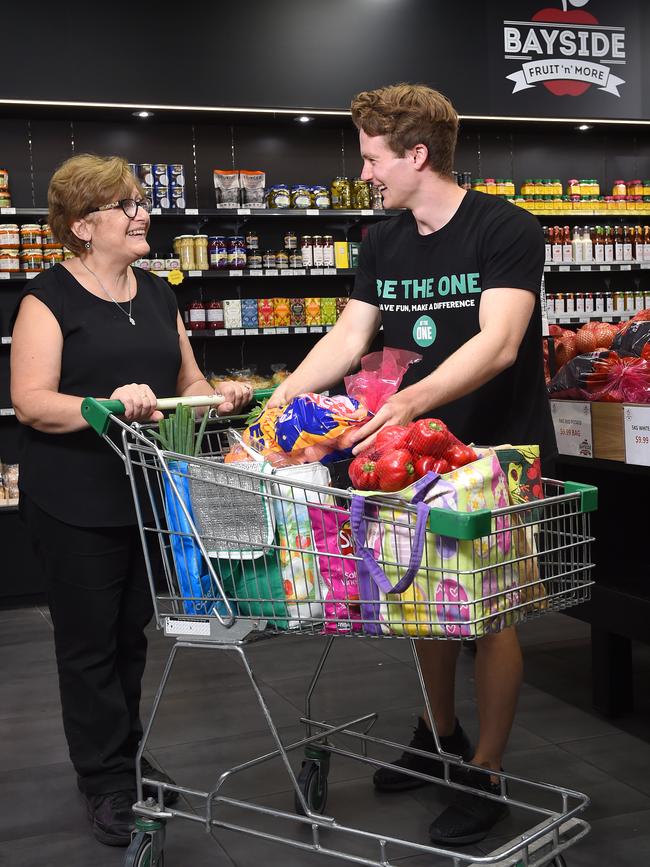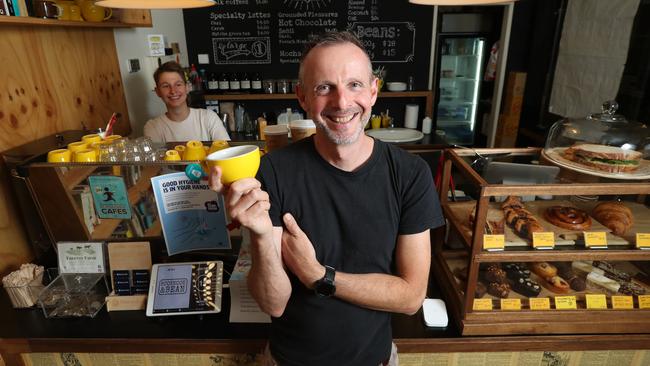The worst and best of humanity: We pick the best of humanity on show in Adelaide amid coronavirus crisis
As is most often the case when natural disaster or major catastrophe hits, the global coronavirus crisis is bringing out the worst and best in humanity. Today we celebrate the latter.
SA News
Don't miss out on the headlines from SA News. Followed categories will be added to My News.
- Poultry in motion: Chicken run as shoppers go clucking mad
- Follow more coronavirus coverage here
- This story about the coronavirus crisis is free for all readers – please consider supporting our journalism with a subscription
As is most often the case when natural disaster or major catastrophe hits, the global coronavirus crisis is bringing out the worst and best in humanity.
The images of shoppers selfishly and greedily stockpiling more items than they could use in a lifetime, juxtaposed against the random acts of kindness from strangers.
Disturbingly, the state’s largest shopping union has called for police to be deployed at supermarkets to ensure retail workers are kept safe from aggressive shoppers.
Heartening is the other end of the spectrum, in line with a growing global movement coined “caremongering”, communities are rallying in this state to generously help those in need.
And it is this spirit that the Sunday Mail and The Advertiser are celebrating in our new campaign #okSA.

When going to the supermarket is like braving a rugby scrum, a random act of kindness can come in handy.
Yesterday, Austin Edwards, a member of charity group Be The One, was out helping elderly shoppers run the gauntlet of the grocery shelves.
“Our motto is ‘have fun, make a difference’,” he said.
“We have the aim of doing a random act of kindness every day this year but because of the virus we have had to cancel a few planned events.
“So today, we went out there to help elderly people with their groceries so they don’t have to go out of their way.”
In Adelaide’s northeast, an established community Facebook page LOVE Campbelltown has added specific threads aimed to help individuals and local businesses.
Founder Julie-Ann Bennett says the overwhelming response from people wanting to help others is touching.

“We know that when people have pride in their city they want to improve the wellbeing of their community, we also know that when others join in, the momentum grows and people start to work together – there is a growing recognition that we are stronger together,” the essential services worker and Campbelltown Citizen of the Year said.

“These conversations and ‘no strings attached’ offers to help really delight my heart.
Help might be in the form of picking up someone’s groceries, taking someone to a doctor’s appointment or getting a script filled at the pharmacist, even walking someone else’s pet.
“We are seeing conversations around shared humanity, of being more considerate of people, of being kind and compassionate … I think people are feeling like they are part of a changing fabric of society (and we) have a potential to reset the way we do things.” Ms Bennett said.
“When this all passes we hope there will be a better understanding of other people and even more sharing of time, resources and skills to benefit others.”
In the Adelaide Hills, Mt Barker District Council deputy mayor Samantha Jones is calling for people to donate items such as toilet paper and long life milk to make up “care packs” for the elderly and other vulnerable residents.
“Let’s show the rest of SA how caring our community can be, let’s look after our neighbours,” she wrote on her Facebook page.
These types of posts are been replicated by individuals and organisations across Adelaide – and beyond.
Also in the Adelaide Hills, a toilet paper drop-off to distribute to the elderly has been organised at Blackwood Bowling, between 4-7pm today (Sunday).
Interstate, a call to action for intergenerational kindness in the face of COVID-19 has inspired an overwhelming response with more than 115,000 signing up to Facebook group, #TheKindnessPandemic.
“Kindness won’t make the virus go away but it will make our lives easier and richer,” writes its Victorian-based creator, aged care doctor Catherine Barrett.
It is a sentiment not lost on Adelaide siblings Campbell and Parker Howlum, aged 9 and 6 respectively.
This week the young brothers decorated their wheelie bin with messages of hope and love ahead of bin collection day.
Mum Kristy Schirmer said the boys wanted to brighten the day of those passing by.
“They created origami love hearts and had envelopes with little notes focused on positive thinking for people, saying things like ‘stay positive’, ‘stay well’ and ‘get well soon’,” she said.
UniSA research fellow and psychologist Miriam Posselt agrees there is growing evidence locally of ‘caremongering’.
“Caremongering allows people to think beyond their own situation which is a positive thing – the message, ‘we are all in this together’ is a positive one,” she said.
“Social connection is really important for your mental health and there is evidence that helping others and showing kindness and compassion to others can improve one’s own mental wellbeing, as well as lifting the mood of others.
“It can help manage some of the negative emotions people are feeling, such as uncertainty, intense fear, a feeling of powerlessness … even feeling anger at some of the panic behaviour we are seeing in supermarkets.”
Relationships Australia National Executive Officer Nick Tebby, too, is buoyed by signs of community cohesiveness, especially in the lead up to Neighbour Day, celebrated each year on the last Sunday of March.
“Normally it would be all about getting people together face-to-face, obviously that is not on the cards this year but we are hearing on a daily basis stories of people reaching out to connect and make sure the people around them are being looked after,” he said.
“Some of the things we are seeing is people dropping little calling cards under their neighbour’s letter box or doormat, just saying, ‘I am here if you need me’.
“It is about being a bit creative and using online technologies and social media to preserve the contact we would previously have face to face.”

Ripple effect of random kindness
When Adelaide couple Kate Jordan-Moore and Tim Potter sent a message to let their friends and acquaintances know they wouldn’t be in public circulation until the coronavirus threat subsided, the response with offers of help was immediate.
Mr Potter, 65, has a weakened immune system due to multiple sclerosis (MS), and the couple is prepared to be in quarantine for many months.
“Tim has had MS for a long time, so we are kind of used to bunkering down in winter during the flu season,” Ms Jordan-Moore, 55, said.
“We just wanted to let everyone know we were well and safe but wouldn’t be seeing them for a while.”
But in response, unexpected offers to help came flooding in, ranging from dropping off meals to walking the dog.
Ms Jordan-Moore said while the couple didn’t need anything personally, they would love it if their friends would support the hospitality industry. “What we’re asking is when someone goes into have a coffee, they pay for an extra, in Tim’s name – that way, we can feel as though we are supporting local cafes and restaurants while we can’t get there ourselves,” she said. “Or to buy takeout direct from a restaurant or buy a gift voucher. Everyone who knows Tim, knows he loves going out for a coffee.”
MORE NEWS:
Pictured: How Hindley St reacted to COVID-19 party ban
Tom Huntley: My life on board a COVID-19 cruise to nowhere
Ms Jordan-Moore said she and Mr Potter were acutely aware of the financial impact of coronavirus on local business. “Hospitality workers can’t work from home and the industry employs so many students,” she said. “Those in the hospitality industry are so generous, I know … restaurants that produced masses of single serve... meals to be sent in refrigerated trucks to relief centres on KI during the bushfires … they did so much but didn’t want any glory. Now they need our help.”
Booknook & Bean owner Paul Arguile was touched. ‘‘Any support (for) small business right now will mean a greater chance of survival in six months time,” he said.
“(Kate and Tim) are quarantined indefinitely … dealing with their own challenges, yet they are still reaching out to support others.”
Stay close to neighbours – at a safe distance
Neighbour Day will still be celebrated next weekend – albeit in a slightly modified way, says event co-ordinator, Relationship Australia National Executive Officer Nick Tebbey.
“Neighbour Day highlights the importance of social connections to combat loneliness and build communities and this messaging has never been more important,” he said.
“This year, we are encouraging building social connections in non face-to-face ways.”
Here are some tips on connecting with your neighbour while practising social distancing:
LEAVE a friendly calling or connection card for your neighbour in their letterbox or under the front door. Include your phone number and let them know if they need company, you are a phone call away.
START a WhatsApp group for your street, dropping cards off to neighbours to see if they want to join in. It just takes someone to get it started and a great way to share messages and connect.
LEAVE a toilet roll as a very neighbourly – and perhaps much-needed – gift.
GO old-school and write a letter and post it or drop it in your neighbour’s letterbox. Or, of course, you can send it by email.
SHARE neighbourly messages on your social media accounts. For example, post a picture with the Neighbour Day selfie-sign.
KEEPING your distance, have a chat, sing or play I-Spy over or through the fence, balcony to balcony, or veranda to veranda.
ORGANISE a virtual morning tea or meal. Grab a cuppa and call or video call.
JOIN or create a Facebook group.
POST a status or notices on community boards offering to drop off groceries and do errands for elderly or disabled neighbours who can’t get to the shops at the moment. If needed, translation services are offered in Facebook groups.
Mr Tebbey said he had been buoyed by signs of community cohesiveness, especially in the lead-up to Neighbour Day.
“Normally it would be all about getting people together face to face,” he said. “Obviously, that is not on the cards this year but we are hearing daily stories of people reaching out to connect.’’
Extend circle of love to our communities
It can be as simple as smiling at a stranger. At a time when uncertainty and chaos are powering greed and selfishness, another human quality, a generous spirit, has emerged from crisis – that of kindness. And experts have warned that acts of kindness – no matter how small – have never been more important. And love, says psychiatrist Karan Sinha, is more contagious than coronavirus. “It also has the power to spread more widely,” Dr Sinha said. “I am seeing a lot of great initiatives like adopt-a-health care worker, or people volunteering to get groceries for someone. Compassion tempers the body’s stress mechanisms, so it is a powerful way to reduce anxiety too, and immunity can be strengthened.
“It’s a good time that the community can rally together against a common enemy – physical isolation doesn’t have to mean emotional isolation.”
Ali Walker, social scientist for the Centre for Social Impact, UNSW Sydney, said Australians would look back on as this period as the time they learned to reconnect with their communities. “Imagine if this once-in-a-lifetime pandemic becomes the turning point for the way we treat each other,”
Dr Walker said.
“Many people who are panic buying … would say that they are thinking collectively, for their family.
MORE NEWS:
Top tips to stay healthy amid coronavirus crisis
How to ease your child’s coronavirus fears and cope with home study
This unprecedented time is asking us to expand our idea of the collective. It’s not just our family.
It’s not just our suburb or community. It’s not just our city or state. It’s not even just our country. We cope with a big world through tiny, kind gestures.”
She suggested some easy ways to be kind included checking in on neighbours and extended family, smiling and waving to strangers or sending a text to frontline health workers to thank them.
“We need connection now more than ever,” Dr Walker said. “Most of all, we need to expand our minds to be others-centred rather than self-centred. Science tells us that being kind is actually one of the best things we can do for ourselves – it boosts our mood and makes us happier.”
Manja Briffa recently joined Facebook page The Kindness Pandemic, which has attracted more than 111,000 members in a week. Alarmed by how people had been treating supermarket staff, the teacher went to her local Coles, bought treats, and then told the cashier to keep them for staff to brighten their day.
“She actually became quite emotional and called the manager over, who said that was the first nice thing someone had done since the craziness started,” Ms Briffa said. “I just wanted them to know people care.”
— Lisa Mayoh
